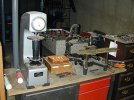OK I'm starting my heattreating experience. Finally got a great blade (man is it nice and satisfing doing your own!). But I learned the hard way that you can get all done only to discover you screwed up the temper or something and all your work is trash.
I picked up one of those bouncing steel ball measurement tools. However, it just doesn't work on 1/8"ish steel.
So my options are:
1. Keep testing with the same file and get used to how the steel reacts (what I'm doing know).
2. Buy one of those hardness testing file kits ($90 for a set or $20 for a single 60rc).
3. Buy a used portable - about $300
4. Buy a used bench top - about $1200 + shipping
5. Buy a new cheap one - about $1000 (MSC Direct)
6. Buy a used punch & microscope gizmo - about $150
Any thoughts are welcome
Steve
I picked up one of those bouncing steel ball measurement tools. However, it just doesn't work on 1/8"ish steel.
So my options are:
1. Keep testing with the same file and get used to how the steel reacts (what I'm doing know).
2. Buy one of those hardness testing file kits ($90 for a set or $20 for a single 60rc).
3. Buy a used portable - about $300
4. Buy a used bench top - about $1200 + shipping
5. Buy a new cheap one - about $1000 (MSC Direct)
6. Buy a used punch & microscope gizmo - about $150
Any thoughts are welcome
Steve

